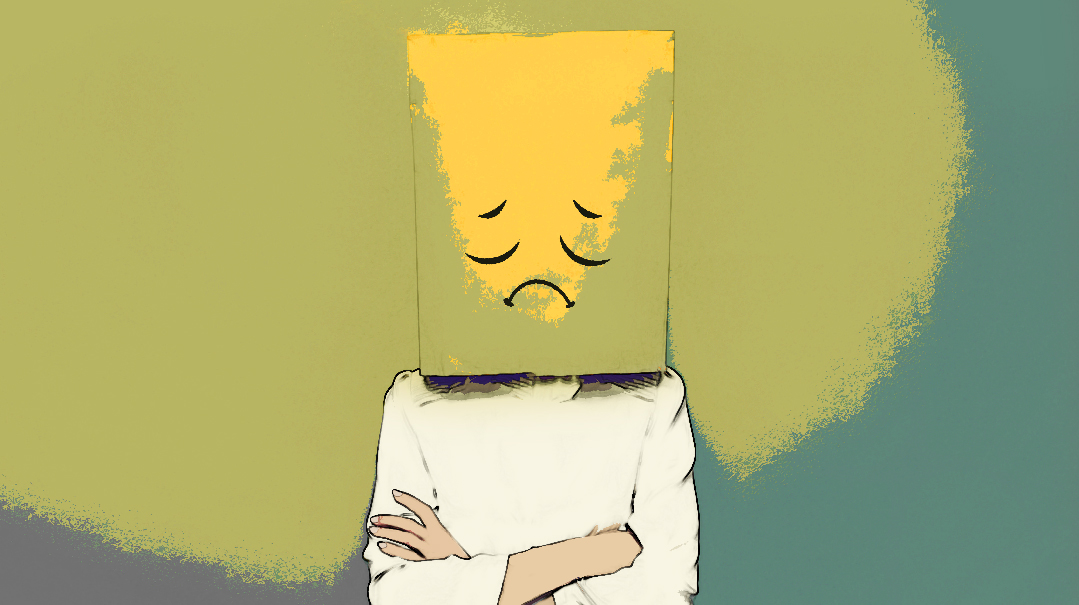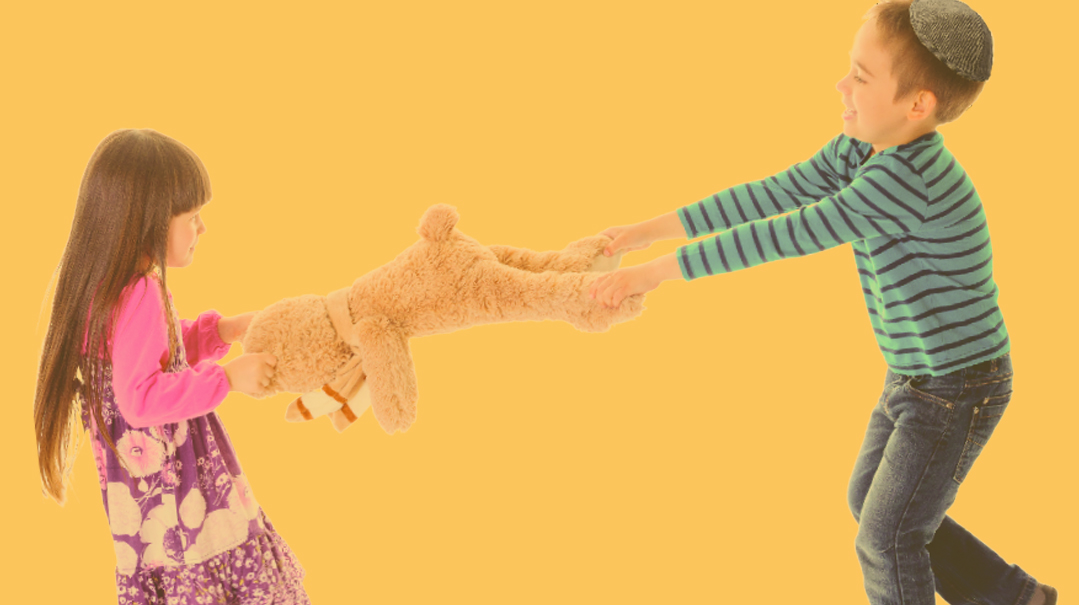Stretched to the Limit
| May 29, 2019"I’ve been on a constant roller coaster ride, trying to be present for my kids at home; helping my mother with everything from doctor’s appointments to shopping; making Yamim Tovim; making weddings; helping my married kids"

Abby Delouya, B.A., B.Ed., MFT-CCC
Goal: To help Esther manage in her role as a “sandwich generation” caregiver
Tools used: Family Resilience Model
E
sther had the look of a defeated soldier. Deep lines accentuated her blue eyes, her back was slightly hunched, and she appeared older than her 58 years.
When she sank into the couch on our first meeting, she exhaled and closed her eyes. When she opened them, they were glistening with unshed tears.
“Hi, Esther,” I ventured gently, careful not to “over-talk.” The silence surrounding her seemed sacred.
“Hi,” she said. “I’m sorry. I know I look like a mess. I am a mess.” She put a hand over her eyes. “I don’t know how I got here.”
“Things feel really overwhelming?”
“Yes. Incredibly overwhelming.”
She suddenly snapped into business mode. “What am I supposed to do here?”
“There’s nothing you’re supposed to do here. What you did — sit and breathe and take some moments to yourself — is a great move. I have some intake paperwork for you when you’re ready…”
“I have a PhD in paperwork and bureaucracy. Earned in the top institute of Hard Knocks,” Esther said with a chuckle.
We went through the intake paperwork, then settled into the first session.
“Okay, Esther. What prompted you to come here?” I asked.
“Well, everything was good until about two years ago. I mean regular, normal. Great times, stressful periods. Nothing out of the ordinary. I work as a travel agent part-time, and my husband is an accountant. We have eight beautiful kids. Six are married. We just made a wedding two months ago. My youngest daughter lives at home. She’s 17 and finishing high school and my 19-year-old son is learning now in Eretz Yisrael.”
“Wow. Sounds like you lead a full and busy life!”
“I didn’t even tell you half of it. I have two married couples living near us. One of them has a baby with special needs. My daughter and son-in-law rely on me a lot for help with the other kids. They have three under four, baruch Hashem, and the baby needs a lot of therapy.”
“That sounds stressful.”
“Yes. But even that would be okay. We want to support our kids and love our grandchildren. What really changed everything was when my father was niftar two years ago. He was 85; he suffered a stroke and never fully recovered. Six months later he got pneumonia and passed away.
“My mother was a pretty healthy 83-year-old at the time, but since then, her health has deteriorated. She moved in with us about eight months ago. I’m the only child who lives here. I have three other siblings scattered about.”
“That must have been a big decision. Did your mother want to move in with your family?”
“She had mixed feelings. She loved her home, but she was scared living there without my father. She’d call me throughout the day, but between work and the kids, I just couldn’t be there as much as she wanted. She also developed diabetes and needs a watchful eye. We rented out her apartment so it didn’t feel so permanent, and she’s been living happily with us ever since.
“But I’ve been on a constant roller coaster ride, trying to be present for my kids at home; helping my mother with everything from doctor’s appointments to shopping, making Yamim Tovim; making weddings; helping my married kids. And working hard to pay for all of it, including helping to support three couples in kollel. Don’t even ask me about my marriage! Life’s been nonstop, and I feel like I’m going to crack.”
“Wow, Esther!! You’ve been under an enormous amount of pressure. But it sounds like you’ve been doing the best you can in a really intense situation. One that’s been lasting for a long time.”
“I guess. It’s just that I also feel really disappointed. And guilty.”
“Those are heavy feelings. Can you share why?”
“From the time I was 22, I had a kid about every two, two-and-a-half years. Those early years were a blur of ear infections, colic, pampers. It was supposed to get easier, but it’s only getting more stressful. And the issues are larger than ear infections. I don’t have the energy of a 25-year-old.
“Then I feel this enormous guilt that I have such a beautiful family that brings us such nachas, and I have a loving mother who is alive. So why am I feeling crushed, like I can’t even breathe?”
“All those facts are true. And in rational, calm moments, that all makes sense. However, when you’re literally being pulled in 20 different directions, with no time for yourself, your limbic system gets flooded. The feeling of being overwhelmed is real. You live a hectic and demanding life, as meaningful as it is.
“Do you think you could be gentler with yourself? Have some compassion for the person you’ve become? Applaud yourself for all the roles you fill: a 24-hour caregiver, babysitter, cook, hostess, cleaning lady, travel agent, chauffeur, confidant… I’m sure the list goes on. It’s a lot, Esther.”
“You’re right. It’s actually really gratifying to hear it reflected back to me. It is a lot.” Esther was lost in her thoughts momentarily. “I do a lot. And, by the way, I do a good job with everyone but myself. My husband has a hot dinner waiting for him at six p.m. every day.”
“Maybe you’re doing a better job with yourself than you think…”
Esther raised an eyebrow.
“You’re here, aren’t you?”
Esther smiled slightly. “Yes. It’s true. My desperation got me here. The only hour to myself I can remember having in months.”
“Esther, your life is hectic and yes, sometimes completely overwhelming. I can’t help you change a lot of the facts. But what I can help you with is managing that overwhelm, helping you carve out some essential self-care time, and reframing your situation by involving more people to support you. Next session, I’m going to explain the ‘family resilience model’ of treatment. In the meantime, you have homework.”
Esther looked taken aback. “I haven’t had homework in over 30 years.”
“Well, now you can empathize with your daughter in high school.”
We shared a laugh.
“Your homework is to practice self-compassion. That means when you feel overwhelmed, instead of judging yourself, you’ll tell yourself, ‘You’re doing so much and you’re doing it so well!’ Sound okay?”
“Yes, sounds fine. I’ll let you know how it goes.” Esther smiled again, revealing a tenderness I hadn’t noticed before. I looked forward to seeing her again the following week.
***
The next time I saw Esther, her eyes were clearer, and she was more focused.
“Hi, Esther. How are you? How was your self-compassionate week?”
Esther laughed. “It was, um, interesting. Let’s just say that I see how self-critical I am.”
“Excellent! Well, not excellent that you’re self-critical, but that you were able to see a pattern. Were you able to practice the compassion part?”
“It felt a bit awkward, honestly. And somewhat cheesy.”
“Yes, it can be uncomfortable to change the way we think, especially when one way has been deeply entrenched. But you don’t have to go to a ‘gushy’ extreme.”
Esther nodded. “I hear that. I guess I’ll tone it down this week.”
“Great. Now I’d like to discuss the ‘sandwich generation.’ Because people are living longer there is pressure on those who are middle-aged to take care of both their aging parents and their children. Some people may find themselves caring for two or even three generations at the same time.”
“Right! There’s my mother, my kids, and my grandchildren. I have a friend who is 51 and she cares for her 72-year-old mother and her 94-year-old grandmother! And her kids and grandkids. You should see her spin in circles.”
“I’m not glad to hear that your friend is overwhelmed, but I’m glad to hear that you have at least one friend with whom you can share your stress and commiserate over coffee.”
“Who has time for coffee? I can’t remember the last time I just relaxed with a friend. Definitely not since my father was niftar. Two years, I guess? Wow. That sounds pathetic…”
“There goes your self-judgment again. Can you rephrase that?”
“Okay. I can’t remember the last time I went for coffee because I’ve been so busy.”
“Better. That’s an important point though, Esther. You haven’t spent time with friends. Feeling isolated and lonely is very common for people in your situation. This goes along with physical strain and exhaustion from doing so much. You lack energy to reach out and socialize. That begets anger and frustration, as it can be distressing to feel that you are putting your life on hold to care for someone — or lots of people.
“This anger and frustration can then lead to guilt for feeling those things. Then there’s the anxiety and fear that comes with watching your mother age, especially on the heels of your father’s death. Or maybe the anxiety comes from financial strain or concern over your work performance? There are a lot of challenging emotions that can keep you stuck in a difficult cycle of distress and despair.”
“Abby, you just named every single emotion I feel on a weekly basis. No wonder I feel so stressed!”
“Absolutely. I’m going to make a couple of suggestions, and you tell me what direction you want to go in first, okay?”
Esther nodded.
“Working on self-compassion is definitely up there, and I’d like to introduce other self-care interventions…”
“Hold on.” Esther put up a firm hand. “This ‘self-care’ business… I know it’s a buzz word, like mindful or codependency, but I’m not a self-indulgent, yoga/meditator lady. No offence to those people — it’s just not me.”
“Here’s a question. Have you ever flown on an airplane?”
“Of course.”
“What’s the most basic instruction they tell you? In the case of emergency, put the oxygen mask on…?”
“Yourself first,” Esther finished quietly.
“You need oxygen, Esther. The plane is going down and you’re running from one person to the next with your hair on fire. Taking care of yourself is paramount.”
“Fine, but it has to make sense for my life, otherwise it’s not going to happen.”
“Totally agree. So, what are some self-care strategies that you can see fitting into your life? I’ll give you some suggestions: exercise, sleep, eating well…”
“Wait! Those are basic human needs. I thought you were going to suggest really indulgent things like mani-pedis and massage every week.”
“Well, those do sound great, and maybe as a special treat you might enjoy those things. But my suspicion is that you don’t carve out time to eat and sleep properly every day. Do you sit down to a good breakfast, or put yourself into bed a little earlier so you can enjoy settling in with a book instead of falling asleep in two seconds flat at one a.m.?”
“That’s weird, Abby. Do you have a video camera in my house?!”
“Well, you shared that basic, personal life stuff hasn’t been attended to properly. So for now, let’s work on sitting down once a day quietly and calmly to meal, preferably by yourself or alone with your husband, and also trying an 11 o’clock bedtime.”
“You sound like me talking to my kids! Eleven is too early. I can try for 11:30.”
“Sounds good. Self-compassion and self-care. That’ll be your focus for the next couple of weeks. And if at any point you feel silly or self-indulgent, please remember the parable of the plane and the oxygen mask, okay?”
Esther nodded.
“Alright. Now, this ‘family resilience model’ I wanted to speak to you about. The concept of family resilience assumes that persistent adversity has an impact on the whole family…”
“That makes sense. I mean, my husband definitely has been impacted. But I try to shield my kids and mother from everything.”
“I understand that inclination, but actually, the research in this area shows that going through stressful times as a family provides huge potential for personal and relationship transformation.”
Esther considered this thoughtfully. “I know in theory that difficulties can ultimately unite people, but I don’t see it happening until the crisis is over and the dust has settled. Right now, I can’t even think about coming together and appreciating closeness. I’m just so focused on surviving each day.”
“That’s exactly why it’s not working for you. Humans are not wired to deal with a constant state of emergency. The freeze, fight, or flight part of your brain is likely shot from being on high alert. As much as you are living in a stressful environment, we could potentially shift from ‘danger/survival’ mode to ‘difficult, but managing well and connected to self and others’ mode. Does that sound like a good goal?”
“Yes, it sounds great, if it’s possible.” Esther seemed dubious.
“Would you be open to having some of your family members come in to discuss this ‘family resilience model’?”
“Oh! They don’t really know I’m here… only my husband knows… why should we involve them?”
“Because the idea is about your family embracing the difficulties together, instead of as individuals all desperately trying to survive. Maybe your married kids don’t need to come in, but would your husband and your daughter who lives at home agree to come in? I assume your mother is too frail to be included.”
“Yes, and I wouldn’t want her to know I’m overwhelmed by her. But I could see my husband and daughter, Tzivi, coming.”
“Great! That’s a wonderful first step. There’ll be no need for everyone to come every week. I need them to come in just once to explain the model to them and then again for a check-up.”
“Okay, so let’s book for the three of us next time. I’ll have to do some convincing with Tzivi, but Reuven, my husband, is grateful that I’m getting help and probably feels as stressed as I do, so he’ll need no convincing.”
“While we don’t want to burden Tzivi unnecessarily, the fact is that her family is going through some challenges. Normalizing crisis and adversity and showing that getting help is okay are all positive things to model for her as a young adult.”
“I agree.”
“Wonderful. Esther, this week, practice your self-care and self-compassion. Let me know if you feel any emotional difference. It’s still the beginning, so don’t get concerned if you don’t feel change right away.”
Esther nodded and smiled. I was looking forward to meeting her family the following week.
***
At the beginning of our next session, Esther reported that while the self-compassionate thoughts were still not coming easily for her, the earlier bedtime and breakfast routine definitely helped.
“Okay, introducing my husband and daughter…” Esther gestured to them. They’d been waiting patiently while we did our check-in. Tzivi seemed to feel awkward, but Reuven appeared relaxed.
“Thank you both for coming in to support your wife and mother. It sounds like it’s been pretty hectic at home. What are your thoughts?”
Reuven started. “I feel badly for my wife. My schedule has stayed more or less the same — I leave the house early for davening, go straight to work, come home for supper, and then I go out to learn at night. But Esther’s running around in circles, exhausting herself between her mother and the kids, and I’m worried about her. There’s not much I can do to help her during the week, so I don’t know what you’re going to tell me to do, but I figured coming here was a good step in showing my wife that I care and am concerned.”
He looked over at Esther meaningfully. It was evident that they had a great deal of mutual respect and love for each other.
“Thanks for sharing that. I think it shows a lot about your character and your relationship that even though your wife has not been as present for you or your marriage in the past couple of years, you’re not focusing on what you’re lacking, you’re focusing your feelings and thoughts towards her. It’s beautiful to see.” Reuven and Esther exchanged a smile, while Tzivi shifted slightly.
“Tzivi, thanks for coming today. Did you at least get to miss class?” I joked lightly.
Tzivi smiled. “Yeah, I did actually.”
“So, Tzivi. Have you noticed anything different going on at home?”
“Well, I know my mother has been more stressed since my Zeidy was niftar. And then Bubby came to live with us, which has been nice, but was a change. And my mother is constantly helping my married siblings. She cooks for them, invites them for Shabbos, babysits my nieces and nephews. She even has them over for sleepovers.”
“Wow. That’s incredible. It sounds like your mom is a really devoted daughter and mother.”
“Yes, she is.” It was Tzivi’s turn to share a smile with her mother.
“What I hear is that both of you, and the rest of the family, have really been able to keep to your regular schedules despite the fact that some changes have happened. It sounds like Esther is doing everything to protect your family, but not herself. I see that you’re a close, generally happy family. You have so much to offer each other as a unit. I think with some changes, Esther will feel better supported, and I don’t think it will impact your schedules that much.”
“Well, of course, if it has to, then I’m okay with that.” Reuven seemed defensive. “It’s not like I ever said that I wouldn’t change my schedule. Some things are not as flexible, like my job, my learning seder, and davening. But I want to do whatever I can, whether it’s on weekends, or on my lunch break, to break this cycle of overwhelm that I’m concerned is destroying my wife.”
“That’s very supportive, Reuven. It’s not like your family is in dire crisis. A crisis means really intense circumstances and feelings, but is usually short in duration. Your family situation, that is, with Esther attending to the needs of her ailing mother, and the needs of the family, is G-d willing going to be longer term. But the pressure is on.”
“So, I’ve been waiting with bated breath,” Esther said. “What’s this ‘family resilience model’?”
“There are three key processes in the ‘family resilience model’: belief systems; organizational patterns; and communication and problem-solving. Today I’m going to go through each process with you, as they have some subdivisions. Then you’re going to take home the information and try to incorporate it into your lives. We’ll have some ‘check-in’ sessions together, and I’ll continue to meet with Esther to see how these strategies are working for you.”
Everyone nodded. The atmosphere in the room was calm. Even Tzivi seemed more relaxed in her seat.
“There are three parts to each of the three key processes. Let’s start with belief systems. The primary breakdown is: making meaning out of adversity; having a positive outlook; and incorporating spirituality. Making meaning out of adversity involves rallying together as a family. When there is a sense that we’re all in this together, then the challenges can be seen more meaningful and manageable. When the challenge is seen as a shared task or burden, then even if there’s someone most centrally responsible, that person doesn’t feel like the burden is all theirs to bear.”
“So basically just making a switch in our thinking, that we are all responsible for Bubby and the grandkids’ care, will make a difference?” Reuven asked.
“Yes. That, along with the other steps: having a positive outlook and incorporating spirituality. In your family’s case, that would be bringing Hashem and emunah into the day-to- day.”
“What’s a positive outlook? Like thinking everything is going to be okay?” Tzivi asked.
“Yes and no. It could mean feeling hope and optimism. But it also means encouraging each other and working on accepting what can’t be changed.”
Tzivi nodded.
“The next key process, organizational patterns, asks for us to be flexible and to utilize social and economic resources. Flexibility in this context means adapting to the new challenges, staying stable through them, and working as a caregiving team so it doesn’t all fall on Esther.”
Tzivi looked alarmed. “But I can’t care for my Bubby in the same way my mom can!” she said.
“No, Tzivi, don’t worry. You don’t have to take on your mother’s role. But it may mean that you spend a bit more time with Bubby, schmoozing or going for a walk, or picking up stuff from the pharmacy for her. Not the heavy stuff. And your Bubby isn’t the only one your mother cares for. What about doing some babysitting for your nieces and nephews or helping out your siblings more? Would you be open to that?”
“I mean, I have school responsibilities. It’s almost major Play. And then planning our grad trip. And chesed hours. I do what I can, but like on Shabbos, I’m off to run my Bnos group… I like, have my own life, too. It’s not my fault my siblings rely on my mom so much. Or that my Bubby moved in.”
Tzivi was mad.
Esther and Reuven looked upset. “Tzivi!” Reuven interjected strongly. “That’s not a way to speak…”
“It’s okay. I’m glad Tzivi is sharing her strong feelings on the subject. You shouldn’t have to totally give up your life, Tzivi. But the idea that families go through stressful times and need support is an important one for you to learn. Imagine if you were in your mom’s shoes. Would you want your youngest daughter to help a bit?”
“Fine, I’ll do some stuff, but I’m not backing out of anything like the Play…”
“No, no. Just maybe spend a bit more time with your Bubby schmoozing at night, or running errands for your mom, or babysitting for your siblings once in a while.”
“I guess I can try it.” Tzivi sat with her arms crossed. She didn’t seem entirely convinced, but her tone was softer.
“I can help on Sundays,” Reuven said. “I could do the grocery shopping and any errands that my mother-in-law needs for the week so that Esther doesn’t have to fit it in after work. I’ll just need a list…”
It was precisely at that point when Esther burst into tears. Both Reuven and Tzivi looked shocked, and Reuven jumped up to get her a tissue.
“What? What did I say? I promise I won’t mess up the list too much… just tell me the difference between a turnip and a parsnip and we’ll be okay,” he said.
Esther laughed amidst her tears.
“What’s coming up for you, Esther?”
“Relief. Such relief. It sounds so simple now, and I have asked my husband to do shopping here and there, but to think of it as his job or Tzivi being open to helping more… it’s such a relief.”
“Fantastic, Esther. And guess what? You all just practiced the third key process: communication and problem solving. That involves clarifying things through words and actions, sharing your emotions, taking responsibility for your own feelings, and having pleasurable interactions. The final part of communication is collaborative problem-solving, which you all just demonstrated beautifully.”
“Wait, so that’s it? What’s so complicated about that? I’ll just babysit more and Mom will be okay?” Tzivi asked in that way only a teenaged girl can.
I laughed. “You’re right, Tzivi. It’s not rocket science. It’s all about changing your mindset and making small, positive, manageable changes. I would guess that just the knowledge that you and your father are taking more directive and personal responsibility at home makes a huge difference to your mother.”
Esther was smiling now. “Yes… I always felt bad asking. I get what you were saying, Tzivi. It’s my mother, and I choose to help with my grandkids, maybe more than some grandmothers.”
“Yes, but Esther, it’s also Tzivi’s Bubby and Reuven’s mother-in-law. And same with the others in the family. And sharing the responsibility actually creates a web of closeness.”
We wrapped up our family session by going over some tasks that needed to be done and dividing them up. We parted with one final reminder: “This isn’t just about sharing a to-do list. This is first and foremost a mentality. You’re becoming closer and building up your family strength.”
In the following weeks, I met with Esther regularly. While we continued to work on her self-care and self-compassionate thoughts, it became obvious that Esther had a hard time letting go.
“I’ve been doing this for so long. It feels silly that Reuven is doing so much or that Tzivi takes Bubby for a walk.”
“Esther, let me remind you that you were literally falling apart at the seams when I met you. And this is not just about who can cross something off your list for you. The whole concept is that family resilience — meaning allowing the family to go through it with you — allows for more emotional closeness, connectedness, and awareness, not despite of the challenges, but because of it.”
It was hard for Esther to integrate that letting go was not a sign of weakness, but rather an opportunity to build personal and familial strength, but she worked on it steadfastly.
We wrapped up our sessions after about three months, although she still comes occasionally for a check in as part of her self-care plan.
“I can’t believe that such subtle shifts could so greatly impact my life,” she said at her last session. “Breakfast. My husband doing the grocery shopping. Tzivi’s babysitting and errand help has been amazing. I feel like I can breathe.
“And you know what the best part is? I enjoy my mother so much more. And my grandkids! I feel so much more gratitude. There’s just more space for it!”
As Esther and I said goodbye, I couldn’t help but pictured the lone, battered soldier I had first met. While Esther’s life circumstances hadn’t changed, I felt gratified knowing that she was going home to an army of support and love.
Abby Delouya maintains a private practice in Montreal.
(Originally featured in Family First, Issue 644)
Oops! We could not locate your form.











